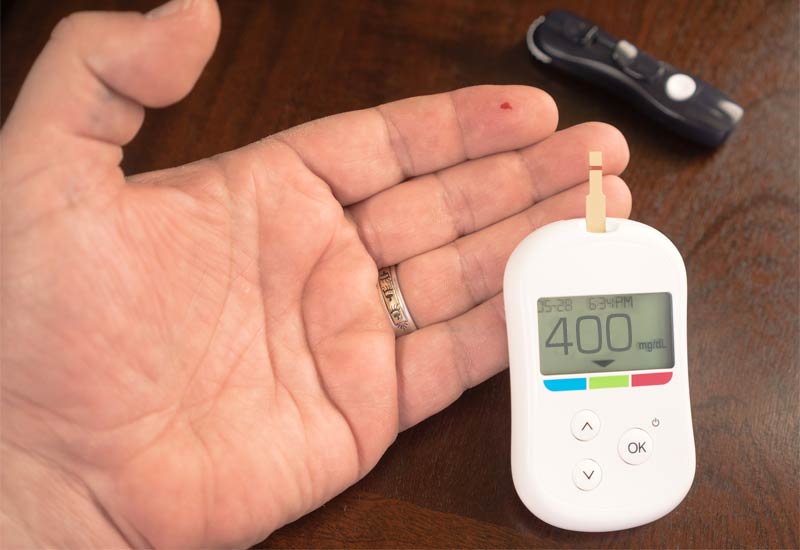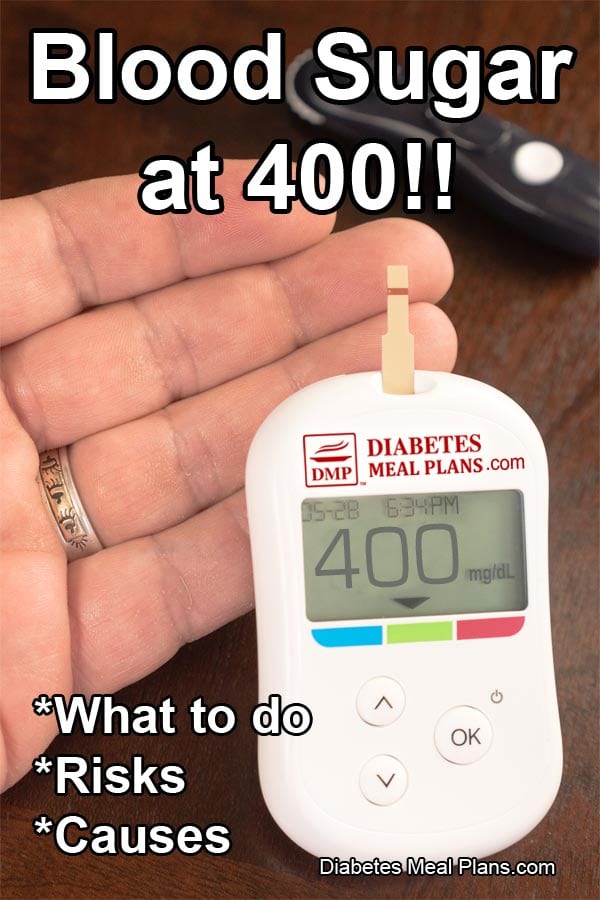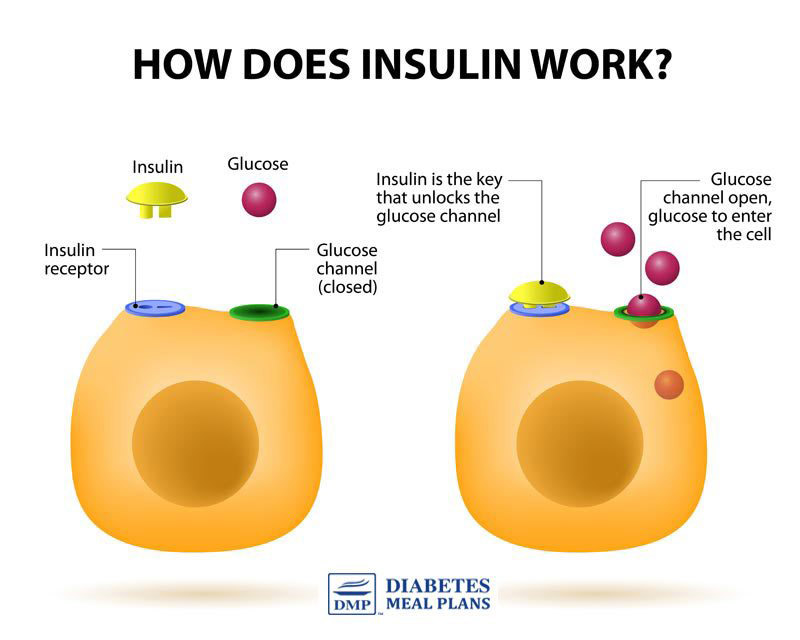Table of Contents[Hide][Show]
If you’re reading this your levels must be high and you probably want to know: is blood sugar level of 400 dangerous?
Yes, blood sugar at 400 mg/dL (22.2 mmol/L) is a cause for concern! Blood sugar over 400 is a serious concern too!
The first thing you need to remember is: don’t panic!
Panicking increases stress hormones, which can further raise blood sugar levels.
Next, use your glucose monitor to re-check and verify your level. If it is in fact high, click here to follow the strategies below to bring your levels down as fast as possible.
Blood sugar at 400 mg/dL (22.2 mmol/L)
There are generally three types of situations where glucose 400 and above occurs.
1. You may not have even known you had diabetes until a visit to the emergency room revealed a blood sugar reading well into the 400 range (>22) – we hear this quite frequently.
2. We also hear another type of story: that high blood sugar levels in the 300s and 400s (>16 to >22s) may be a frequent occurrence. If you stick your head in the sand and leave your diabetes uncontrolled, that’s what can happen – and it’s not what you want.
3. You test and get a “random” high level that seems unusual. While a “random” high level is still cause for concern, the important thing to recognize is that chronic (long-term) high blood sugar is where the real danger lies. 400 blood sugar over time is not a good place to be. That’s when you’re at risk of serious diabetic complications.
Regardless of the situation, it’s important to understand why high blood sugar is a problem, how to catch it sooner, and what to do if it occurs. Keep reading because that’s what we’ll cover below.

Normal Blood Sugar Levels
If you’re unsure of what your blood sugar should be, here’s the numbers to focus on:
Fasting glucose – 70-99 mg/dl or 4-6 mmol/l (Note: there is some debate about the normal range in mmol/l, ranging from 5.5 to 6 mmol/l)
2 hours post meal glucose – Less than 140 mg/dl or less than 7.8 mmol/l
Random glucose – Less than 140 mg/dl or less than 7.8 mmol/l
These are ideal ranges to work towards.
Of course, if you have blood sugar levels at 400 (22), you are well over what’s considered a healthy range.
If your levels are not within those ranges, read more about blood sugar levels here.
Symptoms of High Blood Sugar
High blood sugar, also known as hyperglycemia, is not always recognizable. In fact, without regularly checking your blood sugar, you may not even be aware that your levels are running high.
If you do get any symptoms, they will be:
- Thirst (Polydipsia)
- Frequent urination (Polyuria)
- Headache
- Trouble concentrating
High Blood Sugar at 400: What Causes It?
Poor diet and lack of medication (missed dose) are the biggest culprits of high blood sugar.
There are a few other causes for high blood sugar that may explain your high reading.
These include:
- Infection, which can raise stress hormones (cortisol and adrenaline) and increase blood sugar
- Illness, such as having the flu, also raises stress hormones
- General stress, which is why it’s not good to panic when your blood sugar is high
- Certain medications, such as steroids
Work with your healthcare team to address any of the above concerns to optimize your glucose control.
Risks With High Blood Sugar Levels
The most immediate issue with high blood sugar is the concern for diabetic ketoacidosis (DKA.) Although more commonly associated with type 1 diabetes, this can still occur in type 2 diabetics, and it is life threatening.
You need to contact your doctor any time a blood sugar reading above 400 mg/dL (22.2 mmol/L) is observed, unless given other instructions by your healthcare team. DKA usually requires treatment in the hospital, so it’s best to be on the safe side.
Other problems associated with high blood sugar are complications such as:
- blood vessel damage
- kidney damage
- eye damage
Over time, chronically high blood sugar can damage blood vessels, which is how these complications arise. And they can be very serious – so please don’t take it lightly!
Blood that contains high amounts of sugar is more “gummy” compared to normal blood, this can create a sticky mess inside your vascular system. In fact, people with diabetes are twice as likely to develop cardiovascular disease compared to age matched subjects.
Neuropathy, or nerve damage, is another painful side effect of chronically high blood sugars.
Symptoms (often in the hands or feet) include:
- Numbness
- Tingling
- Burning
Prevention is better than cure! Because once diagnosed, nerve damage isn’t fully reversible. Lowering your blood sugar and A1c can help slow the progression of the damage. And of course, keeping your blood sugars in a healthy range can prevent nasty consequences!

What To Do If Blood Sugar Is Over 400
When your blood sugar is at or over 400 mg/dL (22.2 mmol/L) you need to stay calm!
Your first step is to wash your hands and use your blood glucose monitor to re-check and verify the result.
If your second reading is still high, call your doctor for further instructions.
Beyond that, there are other steps you can take to help your situation, and your doctor may recommend these too.
DO take medication or insulin if required
If you are taking insulin and on a sliding scale, check your scale and take your medication as prescribed.
If you skipped a dose of an oral medication, contact the pharmacy for instructions on getting back on track with your scheduled dose.
TIP: If you frequently find you are forgetting to take medication, try setting an alarm on your phone for daily reminders. It’s also helpful if you keep your medication in plain sight and in a place you visit frequently such as a kitchen or bathroom.
DO go for a walk
When you have high levels, a gentle walk can help lower levels faster. Just don’t overdo it! And keep your phone handy in case you need help. Or better still, take a family member or friend for a stroll with you.
Exercise increases your sensitivity to insulin and helps glucose enter your cells, moving it out of your bloodstream.

Most people with type 2 diabetes are insulin resistant, meaning your pancreas produces insulin, but your body doesn’t always recognize it or know how to use it. Exercise helps your body recognize insulin and better allows insulin to do its job.
DO drink water
Drinking water can help dilute the glucose in your blood, helping to lower blood sugar.
Drinking excess amounts of water is not a long term solution, but can help lower blood glucose during hyperglycemic episodes.
DO NOT eat anything
Any food, even “healthy” food is going to raise your blood sugar further. Despite the myriad of health claims out there, there is no food that will actually lower your already high blood sugar.
Only time and insulin (or sensitizing your body to insulin) will lower your blood sugar.
Wait until your blood sugar returns to range before consuming your next meal or snack.
DO NOT become discouraged
First, becoming upset or angry is not going to change the situation. High blood sugar can occur occasionally, even in those with well controlled diabetes. Focus on what you can do (see above) to remedy the situation.
Second, remember that one high blood sugar reading won’t cause blood vessel damage, but if you have reoccurring or chronically high blood sugar levels, you need to do something about it – over time these complications can be very real and serious, even life threatening.
What to Do After You Overcome a High Blood Sugar Reading
Make it a priority to understand what caused your high reading in the first place, so you can focus on how to prevent it from occurring again.
Was it a stressful event that caused this? Was it an illness? Was it something that you ate? A food with lots of simple sugars? Or did you drink a soda? If it was a food or drink, you know to avoid it in future and start making better choices.
Is it that you have been ignoring your diabetes and not taking care of yourself? And it may be that you have high blood sugar all the time? What can you do to rectify this? Eat better? Exercise more?
Most importantly, you want to get your levels back into a normal range. We’ve helped our members with 400 blood sugar levels get back to normal pretty quickly. Here’s what Alan said.
“Love your site and recommended it friends. My blood sugar was a whopping 396 (22.0). My doctor put me on Metformin 750mlg. I weighed 269 lbs (122kg) and was 72 years old. To date I have lost 35 pounds (15.8kg) and my blood sugar average 94 (5.2) 2-hours after evening meal and 103 (5.7) in the morning. I have been following your suggested menus.”
~Alan S
Get proven practical support to lower your blood sugar and A1c, weight and medications, with Dr Jedha’s T2Diet Program.
Conclusion
When it comes to high blood sugar at 400 mg/dL (22.2 mmol/l), or any type of hyperglycemia (above 140 mg/dL/ 7.8 mmol/l), it is important to be proactive and gain control as soon as possible.
After that, make it a point to take care of yourself and work hard to gain good control of your numbers – protecting your health is worth the effort!
What you eat directly impacts your blood glucose, so focus on eating the right type of foods, foods that help with good blood sugar control.
With changes to your diet and lifestyle, you can see dramatic changes in as little as a few months, just like Alan did.
If you need help with your diet and nutrition, join us as a member.
You’ll gain access to weekly meal plans, along with diabetes-specific tools, resources and support that help you get the best results.



I m 30 and my sugar level post meal 390 hence i rush to hospital asked doctor for advice and medication as doctor prescribed the tablet. My only worry is if i start taking tablet i will end up my life taking tablet. Can i control without tablet and lead normal life
Hi Prasa, sorry to hear of your recent blood sugar struggles. Many people can reduce or eliminate their medication and do not end up taking medication for life. However, you need to work on getting your blood sugar levels lower and keeping them there. You can do this with a good nutrition plan and a healthy lifestyle. To get started, explore some of our website resources or for more help and support, you may consider joining us as a member.
Going through lots! Many drs. Moving appts around 2nd biopsy tomorrow.
Advice for 400+ blood sugars. No exercise, regular good food, behind in insulin cause being sick. How can I perk up this week or do I just go to ER,? Endo specialist say hospital. I’m trying
There are some tips in the info above to help, but you should always follow the advice of your endo and healthcare team as they know you personally. If they recommend you go to the ER at a certain level, then please do so.
Help! I had surgery today for a fistula placement in my arm for dialysis. I am a type 1 diabetic for over 50 years. I am 63 years old. The site is slightly bleeding in one corner. However, there is no swelling, pain, discoloration, numbness in hands etc. My blood sugar was excellent during the procedure. But, this afternoon and evening BG has shot up so high DExcom and meter won’t read results. They only show high. I have changed sites on insulin pump 3 times and taken 60 units of insulin via shots to no effect. Do i go to the hospital???
For circumstances such as this, please seek medical attention.
Hi. I’m Patty. My sugars are in the high 300sxand today it was 407. I take 500mg of metformin and Lantus solostar. I take 30 MG but my hands feel weird what should I do?
You need to call your physician immediately if the numb hands are a new problem. Overall, lowering your blood sugars will help prevent further numbness and diabetic complications. Reducing carbohydrate intake is the #1 way to do this – read here. You may benefit from a medication adjustment, which I would recommend discussing with your doctor. Leaving your blood sugar in the 300-400mg/Dl range long term can lead to serious problems down the road.
I was trying to simply get information and read on where it said become a member. Something told me it’s gonna cost and I was right. I can’t afford much at all let alone almost $150. Thank you for the information though it did help. No way I can afford that. I’ll have to do a lot of reading
There’s enough info on the site for free that can help Renee, so feel free to explore. 🙂
Hi, I am out of control. I have a bs of 402. I am 67” and 236 lbs. My average bs for the past week has been around 296. I have been taking my meds but they don’t seem to help. Your info was helpful.
As you just read high blood sugar is nothing to ignore. Now is the best time to take action and work on lowering your average closer to the 140 mg/dL range (ideal.)
Remember, carbohydrates are the nutrient that most effect blood sugar levels. This list includes all of the foods we encourage for best blood sugar control.
You may benefit from joining our 30 Day Turn Around Program to get your health headed in the right direction.
as a type one diabetic i cannot seem to put on weight
i am too thin can you help
Hi Anne, while all of our articles and research is geared towards patients with type 2 diabetes I would still suggest you check out this article about healthy weight gain. The best way to increase your calories, and still follow a healthy diet, is to increase your consumption of healthy fat sources such as nuts/ nut butter, coconut oil, olives, and avocados.
Hi! I am a 71 year old female. I’ve had type 2 for years. Recently my blood sugar is way off. One evening it was 336. I drank water..it lowered to 285. Later back up to 299. First think in the morning it was 243. I’m having an awful time lately.